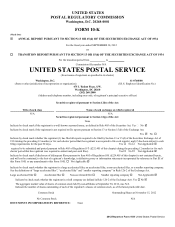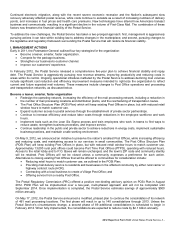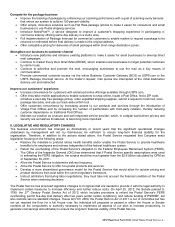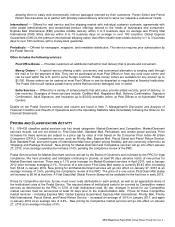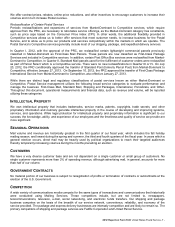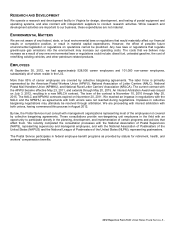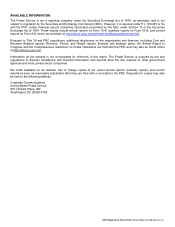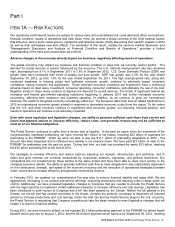US Postal Service 2012 Annual Report Download - page 11
Download and view the complete annual report
Please find page 11 of the 2012 US Postal Service annual report below. You can navigate through the pages in the report by either clicking on the pages listed below, or by using the keyword search tool below to find specific information within the annual report.2012 Report on Form 10-K United States Postal Service- 10 -
Part I
ITEM 1A — RISK FACTORS
Our operations and financial results are subject to various risks and uncertainties that could adversely affect our business,
financial condition, results of operations and cash flows. Here, we provide a broad overview of the chief external factors
that influence, and in some cases govern, operations and financial results, briefly discussing their specific impacts in 2012
as well as their anticipated near-term effects. The remainder of this report, notably the sections entitled “Business” and
“Management's Discussion and Analysis of Financial Condition and Results of Operations,” provides a further
understanding of the risks and uncertainties we confront.
Adverse changes in the economy directly impact our business, negatively affecting results of operations.
The global economy may impact our business and financial condition in ways that we currently cannot predict. The
demand for postal services is heavily influenced by the economy. The U.S. national unemployment rate has remained
high, decreasing from 9.1% in September 2011 to 7.8% in September 2012. U.S. Gross Domestic Product (GDP) real
growth rates have continued their trend of steady, but slow growth. GDP real growth was 2.3% for the year ended
September 30, 2012, up from 1.6% for the year ended September 30, 2011. The high unemployment rate, along with
continued weakness in housing prices and lackluster economic growth, continue to adversely impact consumer
confidence, raising economic risk significantly. These uncertain economic conditions are expected to have a continuing
adverse impact on retail sales, investment, consumer spending, consumer confidence, and ultimately the use of the mail.
Negative trends in these areas continue to depress the demand for postal services. The threat of significant federal tax
increases and federal government spending reductions beginning in January 2013 has further increased economic
uncertainty, affecting both consumer and business spending. In addition, as we continue to grow our international
business, the health of the global economy increasingly affects us. The European debt crisis took on added significance in
2012 as international economic growth slowed in response to decreased economic output from the region. To the extent
that the U.S. and other countries continue to experience slow economic growth, our business, financial position, and
results of operations will continue to be adversely impacted.
Even with some regulatory and legislative changes, our ability to generate sufficient cash flows from current and
future management actions to increase efficiency, reduce costs, and generate revenue may not be sufficient to
meet all of our financial obligations.
The Postal Service continues to suffer from a severe lack of liquidity. In the past six years, since the enactment of the
congressionally mandated prefunding, we have incurred $41 billion of net losses, including $32 billion of expenses for
prefunding to the PSRHBF. While we were not able to pay the $11.1 billion of prefunding obligations in 2012 - this
amount has been expensed and is reflected as a liability in our balance sheet. We have paid $21 billion of cash to the
PSRHBF for prefunding over the past six years. During that time, our debt has increased by nearly $13 billion, reaching
the $15 billion borrowing limit at the end of 2012.
Our strategies to increase efficiency and reduce costs by adjusting our network, infrastructure, and workforce, and to
retain and grow revenue are currently constrained by contractual, statutory, regulatory, and political restrictions. Our
competitors are not constrained by these factors to the same extent and have been able to react more quickly to the
changing economic climate. The ability to generate sufficient cash flow to meet obligations is also substantially dependent
on the continuance, strength, and speed of the economic recovery and the execution of operational strategies available
under current law to increase efficiency and generate incremental revenue.
In February 2012, we updated our comprehensive five-year plan to achieve financial stability and repay debt. We are
aggressively innovating in our product and service offerings, improving productivity and reducing costs in areas within our
control. Additionally, we have proposed legislative changes to Congress that are needed to provide the Postal Service
with the legal authority to implement certain additional measures to increase efficiency and cost savings. Legislation has
been introduced in both houses of Congress and a bill has been passed by the Senate. Neither the bill passed in the
Senate, nor the bill that has cleared committee in the House, contains the authority necessary to implement all required
actions to increase productivity and cost savings. Given the vital role that the Postal Service plays in the U.S. economy,
the Postal Service is requesting that Congress expeditiously take the steps needed to enact legislative changes that will
enable it to return to financial stability.
During 2012, we were forced to default on the required $5.5 billion prefunding payment to the PSRHBF for retiree health
benefits which was due by August 1, 2012, and the $5.6 billion payment which was due by September 30, 2012, resulting

